

Great Lakes Bioenergy Research Center. The materials below were developed by teachers and professional educators associated with the Great Lakes Bioenergy Research Center with input from our scientists.
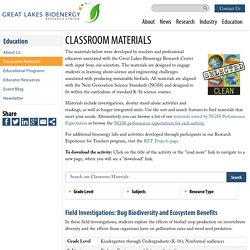
The materials are designed to engage students in learning about science and engineering challenges associated with producing sustainable biofuels. All materials are aligned with the Next Generation Science Standards (NGSS) and designed to fit within the curriculum of standard K-16 science courses. Materials include investigations, shorter stand-alone activities and readings, as well as longer integrated units. CitSci.org - Home. Problem-Based Learning at University of Delaware. Pbl.ccdmd.qc.ca.
Problem-based Learning in Biology with 20 Case Examples. Project Based Teaching on Pinterest. Problem Based Learning & Scientific Inquiry in Introductory Biology. Work Sheet. PBL. Category: Pbl. Deeper Learning MOOC (DLMOOC) Weekly course materials and events will be posted shortly before each week begins.
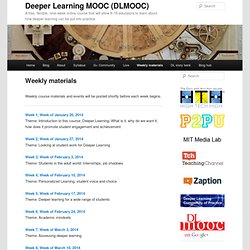
Week 1, Week of January 20, 2014 Theme: Introduction to this course; Deeper Learning: What is it, why do we want it, how does it promote student engagement and achievement Week 2, Week of January 27, 2014 Theme: Looking at student work for Deeper Learning Week 3, Week of February 3, 2014 Theme: Students in the adult world: Internships, job shadows Week 4, Week of February 10, 2014 Theme: Personalized Learning, student voice and choice Week 5, Week of February 17, 2014 Theme: Deeper learning for a wide range of students Week 6, Week of February 24, 2014 Theme: Academic mindsets Week 7, Week of March 3, 2014 Theme: Assessing deeper learning. Recommended for PBL World 2014. Vegetation education: Ex-forester dedicated to teaching the next generation. When Sam Gilbert asked students more than a decade ago what conifers were in the forests around Helena, no one had an answer.
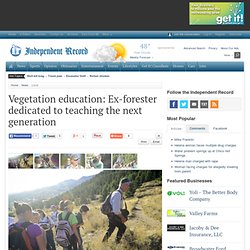
So Gilbert set out to change that. Since 2002, Gilbert, a retired forester who spent about 35 years working for the U.S. Forest Service in northern Idaho and Montana, has been volunteering his time to organize a day during which seventh grade students from C.R. Anderson middle school get to collect data on the vegetation in plots set up on Mount Helena. “As a school, we’re so grateful that he has wanted to include us in this project,” C.R. Hagengruber, a seventh grade life sciences and English teacher, has been including her students in the project since the first teacher involved in the program retired six years ago.
The entire group of about 60 students on the seventh grade team led by Hagengruber and fellow teacher Mike McGinley participates in the field inventory day. While the students are preparing, so is Gilbert. It’s practical work. “We’re gaining on that. Project-based learning program comes to Cedar Rapids Community School District. By Meryn Fluker, The Gazette Three teachers are preparing to venture into new educational territory with 90 students.
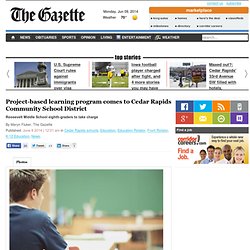
This fall will mark the debut of The Roosevelt Option, a project-based learning program for eighth-graders at Roosevelt Middle School in the Cedar Rapids Community School District. Principal Autumn Pino, who helped design the framework, said it’s not a pilot but a “prototype.” The Overflowing Froth of Realness: Iowa BIG. Teaching A quick primer on what we do at Iowa BIG: It’s been slow, especially because I’m used to running my own little kingdom of a classroom, but Iowa BIG is bearing the fruit of a community-focused, project-based model.
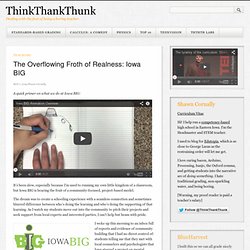
The dream was to create a schooling experience with a seamless connection and sometimes blurred difference between who’s doing the learning and who’s doing the supporting of that learning. As I watch my students move out into the community to pitch their projects and seek support from local experts and interested parties, I can’t help but beam with pride. Institute for Global Environmental Strategies >> ESS Modules. Problem-Based Learning at University of Delaware. Project Based Learning. News. It’s the year 2252, ten years after the Great Plague that ran through the Earth’s population, killing millions, and causing the collapse of civilization.
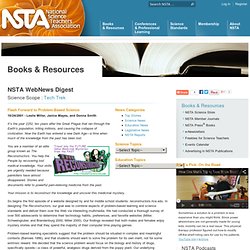
Now the Earth has entered a new Dark Age—a time when much of the knowledge from the past has been lost. You are a member of an elite group known as The Reconstructors. You help the People by recovering lost medical knowledge. Your skills are urgently needed because painkillers have almost disappeared. Stories and documents refer to powerful pain-relieving medicine from the past. Your mission is to reconstruct the knowledge and uncover this medicinal mystery. So begins the first episode of a website designed by and for middle school students: reconstructors.rice.edu. Problem-based learning specialists suggest that the problem should be situated in complex and meaningful contexts (Barrows 1986), and that students should want to solve the problem for its own merit, not for some extrinsic reward.
Why use this Web adventure in the classroom? Search NSTA Journal Archives. Project Based Learning.
Learningcenter.nsta.org/files/tst0811_44. TEDxNYED - Alan November - 03/05/2011. Project Design Rubric.